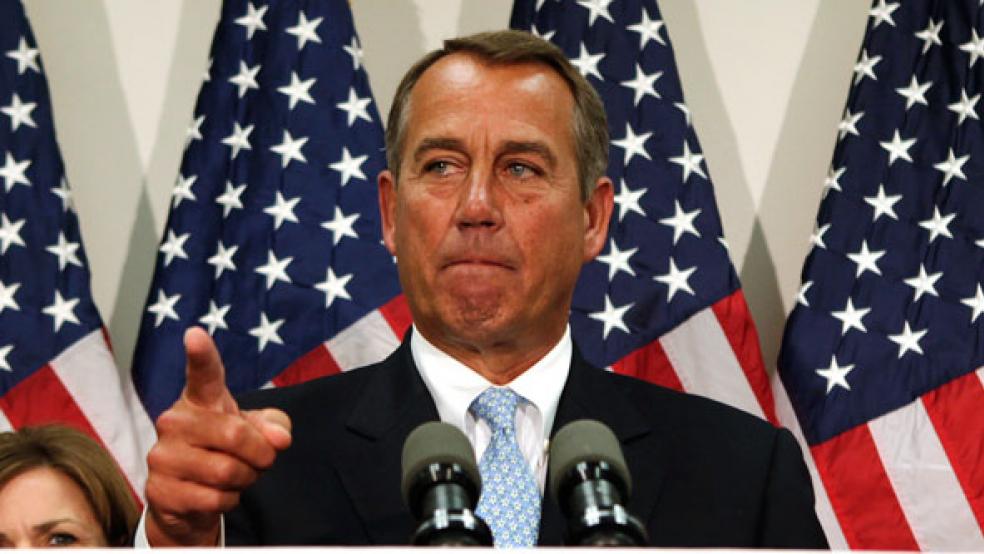As House Speaker John Boehner backed down on the debt ceiling and partial government shutdown, he was already focusing on the next battle with Democrats—taxes.
The country may have averted disaster on Wednesday, but the partisan differences on taxes are a sign that the dysfunction of the past year could continue … indefinitely.
The Ohio congressman conceded defeat in an interview with a local Cincinnati radio station. House Republicans forced a shutdown at the start of October, after demanding that Obamacare be defunded, then delayed, and eventually tweaked.
“We fought the good fight,” Boehner said. “We just didn’t win.”
RELATED: GOP'S UNPASSABLE PLAN C: DELAY OBAMACARE FOR A YEAR
As the government faced potential default this month without a debt limit increase, the Senate passed a bipartisan plan to keep the government going through early next year and form a committee to negotiate a larger budget deal.
Their sole change to the 2010 Affordable Care Act was cosmetic, stipulating that Americans receiving government subsidies to buy health insurance have their incomes verified. Boehner failed on Tuesday to unite the House GOP caucus around an alternative plan, causing him to submit the Senate plan for a floor vote yesterday.
With the government reopening and the debt limit raised, Boehner cares about what lies ahead. When negotiations resume over the budget in a conference committee made up of lawmakers from both chambers, the speaker plans to stand firm against a tax hike.
RELATED: 10 WORST STATES FOR TAXES
He suggested on Wednesday that negotiations would fail if Senate Democrats plan to raise revenues, which just happens to be an integral part of the budget blueprint they passed last spring.
“If they’re going to hold onto their position that we’re going to raise taxes, we’re not going to come to an agreement,” Boehner said.
Just as Republicans could not force Democrats to abandon Obamacare, Senate Majority Leader Harry Reid (D-NV) and President Obama can’t force the GOP to raise more in revenues.
GOP TURNS THE TABLES ON A LONG TERM BUDGET DEAL
The idea behind a conference committee is to meld two competing bills into a compromise that can pass both chambers, a task that appears to be impossible. When Democrats raised tax rates on household incomes above $450,000 this year, they gained leverage because tax rates would have been hiked on the entire country unless congressional Republicans agreed to the fiscal cliff deal.
House Republicans passed a budget blueprint that kept revenues flat—while flattening rates by closing loopholes and ending unspecified deductions. GOP congressmen have insisted that any reforms not cause a net tax increase.
Senate Minority Leader Mitch McConnell (R-KY) added on Wednesday that the roughly $1.2 trillion in automatic sequestration cuts from the 2011 Budget Sequestration Act would also be preserved.
“This legislation is the largest spending reduction bill of the last quarter century and the largest deficit reduction bill since 1981 that didn’t include a tax hike,” McConnell declared in a Senate floor speech announcing the Wednesday agreement. “Preserving this law is critically important.”
But House Budget Committee Chairman Paul Ryan (R-WI)—a likely conference committee member—indicated in an editorial for The Wall Street Journal last week that there could be flexibility in the nature of those cuts.
The core of Ryan’s argument is that entitlement reform is an area ripe for bipartisan compromise. Obviously, taxes are not.
RELATED: HOW PAUL RYAN WOULD ERASE OBAMA'S SOCIAL CONTRACT
“[M]ost of us agree that gradual, structural reforms are better than sudden, arbitrary cuts,” Ryan wrote. “For my Democratic colleagues, the discretionary spending levels in the Budget Control Act are a major concern. And the truth is, there's a better way to cut spending.
“We could ask the better off to pay higher premiums for Medicare,” he continued. “We could reform Medigap plans to encourage efficiency and cut costs. And we could ask federal employees to contribute more to their own retirement.”
Senate Democrats undo sequestration in their budget, offsetting the cuts in part with $923 billion in tax hikes over the next decade. Those increases would come from limiting tax deductions and write-offs for wealthier Americans and corporations. Their plan also includes $100 billion to invest in infrastructure projects and job programs.
Reid told the country that the shutdown and debt limit deal would “provide our economy with the stability it desperately needs,” but the arrangement does not offer any means to bridge the differences on taxes and spending.
In accepting defeat on Wednesday, Boehner refused to end the battle over the deficit and Obamacare. He said in a statement to buck up the GOP faithful, “That fight will continue.”





